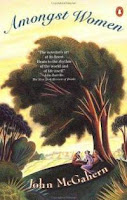The spring weather has been lovely here - sunshine and clear skies, but still cool enough to walk up into the mountains.
We went off to explore some of the ancient 'Pilgrim Paths' in the Alpi Apuane - this one starting on the hill just above our little house. I'm not sure why they call them Pilgrim paths because they seem to have been constructed to connect the little hamlets on the mountainside with each other and with the towns on the coastal plain. Some of them were also used by workers in the marble quarries - many of whom walked for two hours to get to work and then two back. They're beautifully constructed with paved edges and cobbled centres, navigating precipitous slopes.
In the spring weather, the stones were dotted with wild crocuses and narcissi growing up through the cracks.
Most of the paths are very well marked, with red dots, as alpine routes - but somehow, in the chestnut forest, we took a wrong turning and found ourselves in a thicket of bamboo. It was only then that we realised that we were in the centre of a ruined village. We should have noticed the clumps of daffodils - remnants of someone's garden, and the beautiful stone walls - all that's left of the terraces they cultivated.
The houses had almost completely vanished. This photograph was taken from about 15 feet away from one of them and, although it's straight in front, you can hardly see it at all.
Down crumbling steps we found what had once been the village piazza. Under a chestnut tree that had taken root in the wall was a water cistern fed by a spring, and a carved trough for washing people and laundry.
As we looked we began to see more and more houses hidden under the cover of wild clematis and bramble.
Doors swung open on scenes of desolation.
The front walls of some houses had collapsed into the valley. From one window I could see the mountains through the remains of what had once been three houses.
We found our way back to the path (it was so obvious we must have been talking or looking at the view in order to miss it!) and soon began to notice more ruins among the trees. This was our favourite - glorious views and much of it still standing. I sat on the front step and fantasised about living there.
The sad thing is that the path we were on leads to Sant' Anna - location of one of the worst massacres in Italy during WWII. These villages too would have been searched and 'cleansed' by troops looking for partisans. That's one reason they're deserted. The other is that living up here is hard - people want electricity, running water, roads.
Two more beautiful things I found in the woods - a magical tree bole like a sculpture and some red, red moss on a silver rock.
We went off to explore some of the ancient 'Pilgrim Paths' in the Alpi Apuane - this one starting on the hill just above our little house. I'm not sure why they call them Pilgrim paths because they seem to have been constructed to connect the little hamlets on the mountainside with each other and with the towns on the coastal plain. Some of them were also used by workers in the marble quarries - many of whom walked for two hours to get to work and then two back. They're beautifully constructed with paved edges and cobbled centres, navigating precipitous slopes.
In the spring weather, the stones were dotted with wild crocuses and narcissi growing up through the cracks.
Most of the paths are very well marked, with red dots, as alpine routes - but somehow, in the chestnut forest, we took a wrong turning and found ourselves in a thicket of bamboo. It was only then that we realised that we were in the centre of a ruined village. We should have noticed the clumps of daffodils - remnants of someone's garden, and the beautiful stone walls - all that's left of the terraces they cultivated.
The houses had almost completely vanished. This photograph was taken from about 15 feet away from one of them and, although it's straight in front, you can hardly see it at all.
Down crumbling steps we found what had once been the village piazza. Under a chestnut tree that had taken root in the wall was a water cistern fed by a spring, and a carved trough for washing people and laundry.
As we looked we began to see more and more houses hidden under the cover of wild clematis and bramble.
Doors swung open on scenes of desolation.
The front walls of some houses had collapsed into the valley. From one window I could see the mountains through the remains of what had once been three houses.
We found our way back to the path (it was so obvious we must have been talking or looking at the view in order to miss it!) and soon began to notice more ruins among the trees. This was our favourite - glorious views and much of it still standing. I sat on the front step and fantasised about living there.
The sad thing is that the path we were on leads to Sant' Anna - location of one of the worst massacres in Italy during WWII. These villages too would have been searched and 'cleansed' by troops looking for partisans. That's one reason they're deserted. The other is that living up here is hard - people want electricity, running water, roads.
Two more beautiful things I found in the woods - a magical tree bole like a sculpture and some red, red moss on a silver rock.























































